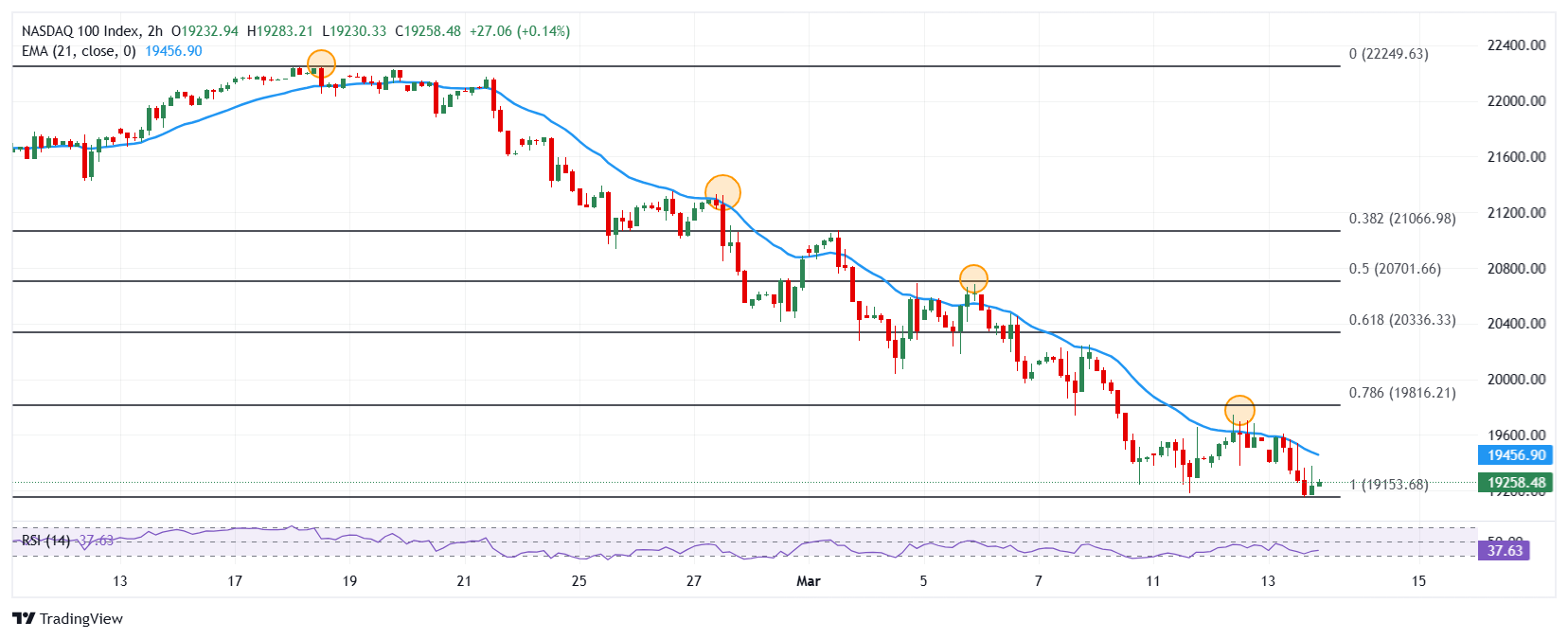- Nasdaq 100 falls 1.54% on Thursday, operating at the time of writing at 19,258.
- Adobe Inc. titles (ADBE) collapse by 13.85%, after making their profit report known.
- The shares of The Trade Desk (TTD) sink 10.50% in the day, reaching a minimum of two years in 53.74 $.
The Nasdaq 100 marked a daily maximum in 19,608, where it found aggressive vendors that dragged the index at least six months in 19,151. At the moment, the Nasdaq 100 operates over 19,258, losing 1.54% today.
The Trade Desk and Adobe Inc. take Nasdaq 100 to a minimum of six months
The values of The Trade Desk (TTD) lose 10.50% on Thursday, reaching minimum not seen since March 13, 2023 in 53.74 $. In the same tune, the actions of Adobe Inc. (ADBE) have a drop of 13.85% today, reaching minimal not seen since May 25, 2023 after presenting its quarterly report.
ADBE obtained income for 5.71 billion dollars compared to 5.66 billion dollars projected, as well as an share of $ 5.08, above the $ 4,973 estimated by analysts. Despite exceeding the expectations of the quarter, ADBE provides that the profit per share for the next period will be located in a range between $ 4.95 and $ 5, while the company projects income between 5.77 and 5.82 billion dollars, slightly below the forecasts of the consensus.
In this scenario, the Nasdaq 100 loses 1.54% daily, reaching minimums not seen since September 11, 2024 in 19,151 $, in tune with the main share rates.
Technical levels at Nasdaq 100
The Nasdaq 100 established a short -term resistance given by the maximum of March 12 in 19,747. The next key resistance is observed in 21,329, in convergence with the exponential mobile average of 21 periods. To the south, the important support is observed in 18,394, pivot point of September 6, 2024.
2 -hour graph of Nasdaq 100

NASDAQ FAQS
The Nasdaq is an American stock exchange that began being an electronic value quoter. At first, the Nasdaq only offered quotes of extraburstile values (OTC), but later also became a bag. In 1991, Nasdaq had grown up to 46% of the entire US stock market. In 1998, it became the first US stock exchange to offer online negotiation. The Nasdaq also prepares several indexes, the most complete of which is the Nasdaq Composite, which represents the more than 2,500 Nasdaq values, and the Nasdaq 100.
The Nasdaq 100 is a large capitalization index composed of 100 non -financial companies of the Nasdaq stock exchange. Although it only includes a fraction of the thousands of Nasdaq values, it explains more than 90% of the movement. The influence of each company in the index is weighted based on stock capitalization. The Nasdaq 100 includes companies that are very focused on technology, although it also encompasses companies from other sectors and outside the United States. The annual average profitability of Nasdaq 100 has been 17.23% since 1986.
There are several ways to operate with the Nasdaq 100. Most of the Stred Betting Retail Corridors and Platforms offer bets through contracts by difference (CFD). For long -term investors, quoted funds (ETF) operate as shares that mimic the movement of the index without the investor having to buy the 100 companies that compose it. An example of ETF is the investment QQQ Trust (QQQ). Nasdaq 100 futures contracts allow specular to the future evolution of the index. The options provide the right, but not the obligation, to buy or sell the NASDAQ 100 at a specific price (exercise price) in the future.
There are many factors that promote Nasdaq 100, but mainly it is the aggregate performance of the companies that compose it, revealed in their reports of quarterly and annual results. American and world macroeconomic data also contribute, since they influence investors’ confidence, which is positive drives profits. The level of interest rates, set by the Federal Reserve (FED), also influences Nasdaq 100, since it affects the cost of credit, which many companies depend largely. Therefore, the level of inflation can also be an important factor, as well as other parameters that influence the decisions of the Federal Reserve.
Source: Fx Street
I am Joshua Winder, a senior-level journalist and editor at World Stock Market. I specialize in covering news related to the stock market and economic trends. With more than 8 years of experience in this field, I have become an expert in financial reporting.







